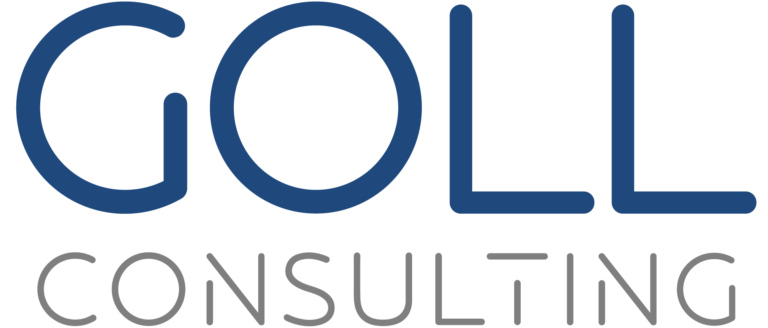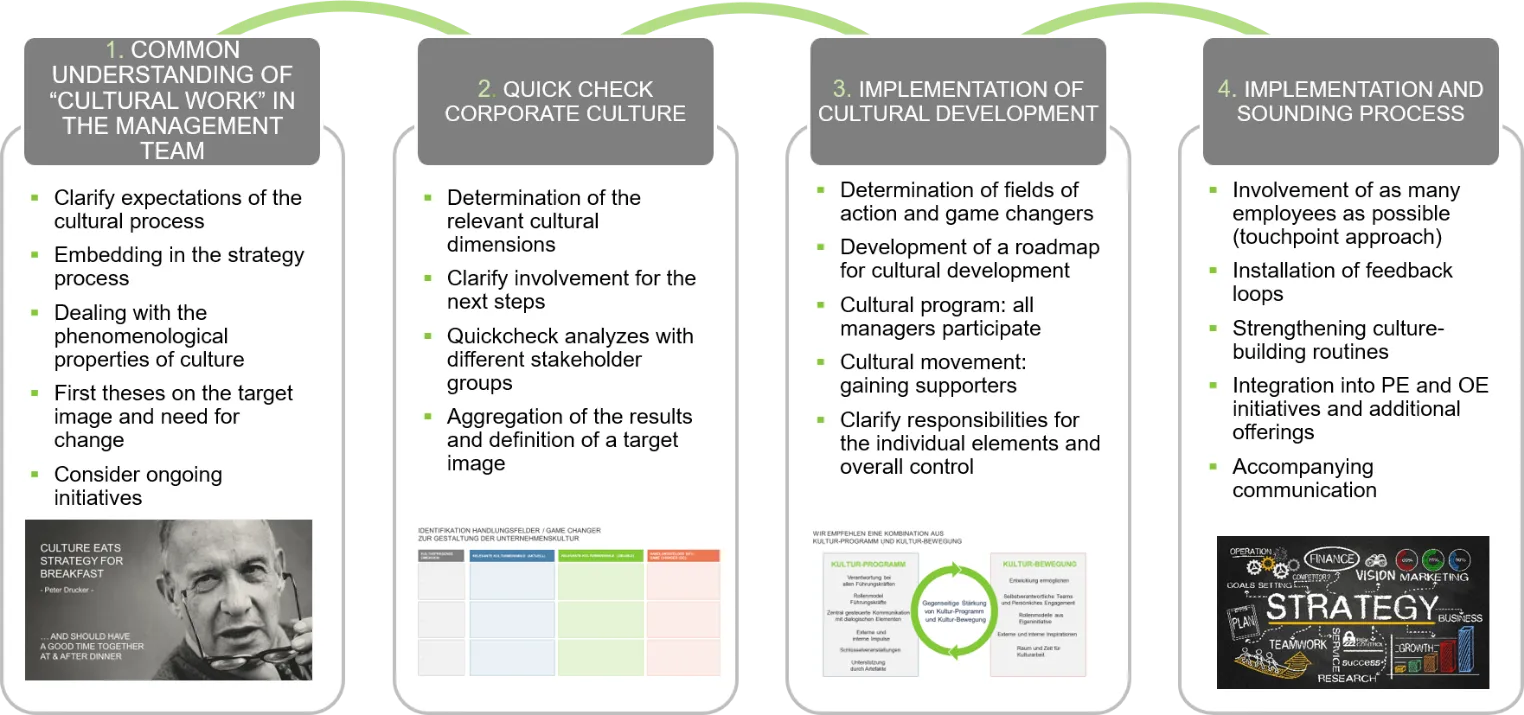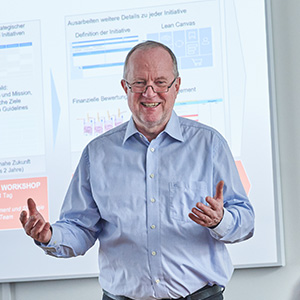DEVELOP CORPORATE CULTURE
Common basic understanding as the basis for successful "culture" work
Does it make sense to want to measure and develop corporate culture? Is that even possible? Doesn’t the intention with which the corporate culture is to be worked on influence the effect as such? And isn’t the behavior, how employees are involved in this process and how companies deal with surveys or interviews, in turn an artifact of culture?
UNTERNEHMENSKULTUR ENTWICKELN
Gemeinsames Grundverständnis als Basis für eine erfolgreiche „Kultur“-Arbeit
Macht es Sinn Unternehmenskultur messen und entwickeln zu wollen? Geht das überhaupt? Beeinflusst nicht die Intension, mit der an der Unternehmenskultur gearbeitet werden soll, die Wirkung als solche? Und ist nicht das Verhalten, wie Mitarbeitenden in diesen Prozess mit eingebunden werden und mit Befragungen oder Interviews umgehen, wiederum ein Artefakt der Kultur?
THEREFORE
THIS IS
IMPORTANT
Corporate culture shapes the mindset and behavior of managers and employees. It can thus act as a supporter or adversary of leadership in a company. With the possibility to act as a business enabler or to be a part of the corporate purpose, it is important from our point of view to track the development of the existing corporate culture, to challenge it and to always look how to influence the developments.
In order to remain innovative and developmental as a company, it is crucial to have a corporate culture that promotes this. Developments and innovations rarely arise from a simple corporate culture. Here, it is important to be multi-layered and to promote subcultures that are oriented toward a common identity-forming core with shared values.
In the entire culture development process, the HOW is at least as relevant as the WHAT.
THIS IS
HOW WE
PROCEED
Successfully influencing culture means jointly developing a common basic understanding of the target image as well as the expectations in the management team. This results in an embedding in the strategy process as well as a roadmap to influence the corporate culture on all levels.
To successfully implement the culture movement, supporters from within the company are recruited to live and promote the culture in the various teams. Through an additional internal communication strategy, managers and employees are invited to engage with the culture on a daily basis.
OUR
SOLUTION
- We clarify the expectations of the culture process in dialog with the top management team.
- We analyze your current culture and its interaction with your strategy.
- We identify potentials for further development with you.
- Together with you, we define initial theses for a target image for your corporate culture.
- We clarify how we can work on the corporate culture with its phenomenological characteristics.
- We conduct quick check analyses with various stakeholders and condense the results into an overall picture.
- Together with you, we define a concrete target image for your corporate culture.
- We contribute content & process expertise from numerous successful culture processes.
- We support you in developing a concrete roadmap with program and cultural movement elements.
- We design and facilitate key events (cultural dialogues, workshops and cultural camps).
- We support you in enabling and empowering supporters.
- We clarify responsibilities within the company with you.
- Together with your teams, departments and divisions, we develop measures to implement the corporate culture.
- We design the interactive and lively communication of the culture with you.
- We accompany you in integrating feedback and sounding loops.
CONCEPTS
AND MORE
We present the following assumptions and premises for discussion:
- There is always a corporate culture. A strong corporate culture shapes the mindset and behavior of managers and employees and is thus either a supporter or an opponent of management.
- A corporate culture (with ethical and moral integrity) is neither good nor bad per se, but only appropriate or inappropriate to the strategic goal picture.
- Corporate culture is primarily a business enabler – but can also be part of the corporate purpose.
- Corporate culture should be an integral part of the strategy – and not an “alibi” or “nice to have”.
- As a rule, there are different manifestations of culture in the company – subcultures. This should be intentional: Innovations and developments rarely come from the mainstream.
- Subcultures differ from the core culture and certain characteristics. What is important is a common identity-forming core with shared values.
- In addition to strategy-oriented culture development, there are other factors that influence a corporate culture – above all, the “spirit of the times”.
- In a culture development process, the HOW is at least as relevant as the WHAT.
- For working on corporate culture, we recommend a phenomenological approach for certain concerns: corporate culture does not adhere to the instructions of the “master plan”, but determines its own development. The development can be actively influenced (not designed) – however, corporate culture is very resistant to development. (Change literature: 5 years for a culture change process).
FROM
THE PRACTICE
Intial situation
An internationally active financial services provider was not only facing a crisis in results, but also a cultural crisis. The new CEO initially saw his main task in using a clear strategic orientation and new values for cooperation to get employees and managers excited about the company again. It was important to him not to separate the two core issues of strategy and culture, but to work on both together: What do we want to achieve? And how do we want to achieve it?
Procedure
First, the new strategy and culture were worked out in detail and described in concrete terms in several Executive Board workshops. Following this, the Executive Board discussed the core statements of the new strategic and cultural alignment first with top management and then with all other executives in management conferences and modified individual aspects.
An interactive large group event was held for the approximately 3,000 employees in Germany. This was consistently dialog-based in order to give employees sufficient time to discuss the new alignment of the company among themselves and with their managers. This event also allowed employees to experience the new culture “live” – courageous, cooperative, working across divisional boundaries.
In the subsequent implementation workshops of the business units, the strategic orientation and the culture of cooperation were again specified. Implementation in the more than 50 foreign subsidiaries was decentralized. In particular, the managing directors adapted the cultural part of the implementation process to local conditions.
Results
- Employee confidence in the new CEO, the Executive Board and top management as well as in the strategy was decisively strengthened. This was shown by an employee survey.
- In subsequent years, the company was always among the top 3 in Great Place to Work.
- The financial results have increased sustainably.
- The national companies have made use of the freedom they have been given and found a good balance between the Group and their own identity.
THAT IS
WHAT OUR
CUSTOMER SAY
"I can now look back on almost 10 years of good and very successful cooperation with Goll Consulting. During this time we have held dialogue conferences several times in 3 different companies in Germany, Switzerland and the Czech Republic. As a result, teamwork was significantly improved, cultural discrepancies were overcome, focus and efficiency were increased, and collaboration was strengthened with a lasting effect. Support in change management, especially in complex change processes, leadership development, moderation and coaching, created significant added value for my areas and the company."
Detlef Steinmetz
CIO Avast Software s.r.o.







